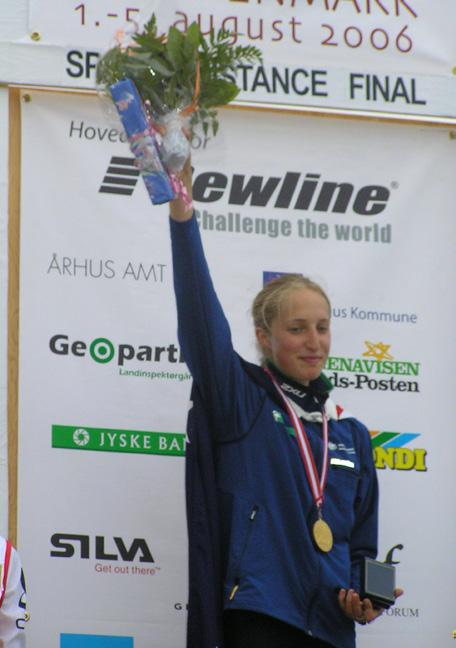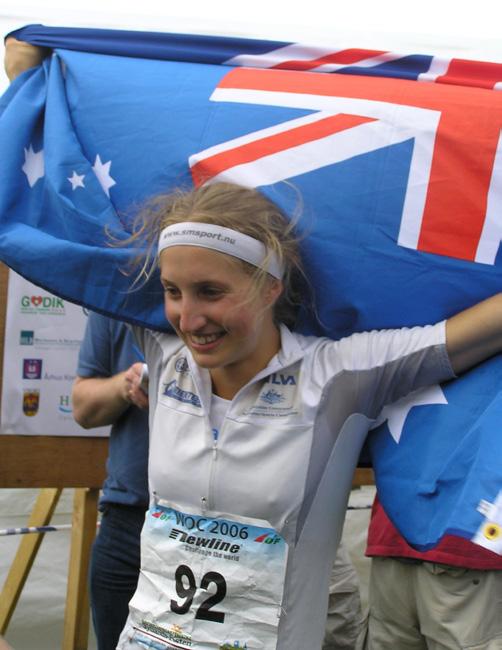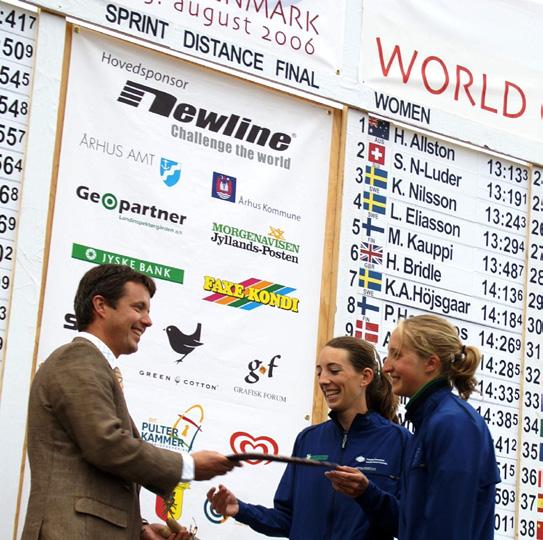
10 minute read
HANNY’S WOC SPRINT MAP
Hanny Allston’s GOLDEN Race



When you think back about the Sprint... Could you actually believe what you achieved when you had finished the race? When did you actually realize, that you had become the World Champion? I guess this wasn’t something you would even dream about?
No, not really. I knew that I was capable of it but I guess when it actually happens it will always be a bit of a shock that you actually DID IT. You just have to see the sequence of photos in The Australian Orienteer (Oct’06, p3) to see this. It wasn’t until my great friend BJ muttered in my ear that I was World Champion that I realized. I started crying - I think mostly because I was sad that my Dad couldn’t be there to celebrate with me, my mum and my friends. I have dreamt about it. And I still do.
Actually, what were you thinking coming into WOC 2006? I think you must have known you were in a good shape, but what were your goals for the event?
I knew I was in good shape. My training had been perfect as had my preparation. I just wanted to improve on last year’s performances. I have to admit I was more focused on the Long but this just proves you should aim high in all your races. I certainly would have been very happy to go home with a podium or even top-10 finish because my main focus in 2006 was JWOC. Anything that happened at WOC was going to be the icing on the cake.
As for the Long distance... I guess it was very difficult for you this time to get back down to earth after what happened the day before and get motivated enough. Was it? Or was there any other problem? I’m guessing this, because of the style with which you ran in the Relay, a technical and tough race, where on the last leg you were able to outclass all your rivals...
The hardest part of the Long-distance was being allowed to refocus. I was woken at 6am by the media in Australia, and continuously hampered by further phone calls. Plus everyone was coming up to me right up to the start congratulating me and patting me on the back. I really appreciated it all but it certainly made it hard for me to focus. Despite this I was very happy with the end of the Long-distance. I felt I improved heaps as the race went on, I was just not focused enough at the start.

JWOC in Lithuania
This was your last JWOC and perhaps, after your result in the Long-distance at the World Champs last year and also after the JWOC bronze medal from the Middle in Switzerland the previous year, many people considered you one of the biggest favorites in the women’s class... How was it for you to deal with the pressure?
What pressure? I don’t believe in pressure. The only pressure I face is that I place upon myself. As I said above I knew that nothing I ever face in life would be as tough as what I faced in the summer. Therefore, standing on that start line was one of the easiest things I had done all year. I was excited and ready for the challenge.
You told me you came to Europe 14 days before JWOC... What were you first impressions of Lithuania and the terrain? Did you like it or not?
To be honest I found it really tough. I was almost a bit freaked out for a while. But then I just told myself to get on with my training, try as hard as I could and just see what happened. I knew that the forest was going to be tough and just kept telling myself that it was going to be the same for everyone. I like it now. I think it is fantastic as it is super challenging: low visibility, quite physical, soft, and technically interesting. Yeah, it’s fun to orienteer there.
How did you like the country in general? Was there anything you found surprising about it?
I loved many aspects of the country. It is a very beautiful place and underneath their tough exterior the people were beautiful and so friendly towards us. The most challenging aspect of the country for me was the food. I am a vegetarian and also cannot have much dairy products so I think this freaked a lot of people out. I laughed when I found out that basically the only soy products I could buy were baby formulas!!!
In the Sprint, there were just 4secs separating you from the gold medal... And although the course wasn’t the most difficult, it seems that you made a
JWOC Sprint winner, Ingunn Weltzien from Switzerland. Photo courtesy Veivalg.
couple of small mistakes during the race, which cost you the gold medal in the end... Can you analyze them? Were they really mistakes?
I don’t agree with this. I didn’t make mistakes, I ran conservatively. Despite everything this season I still do not consider myself a sprint orienteer… I love the longer distances and this was my main focus at JWOC. The last thing that I wanted to do in the Sprint at JWOC was try to go too hard too early and then make massive mistakes so I ran conservatively. I am super happy with this run - she (Ingunn Weltzien) was just better on the day. She is a beautiful athlete and a great friend and I take my hat off to her with that fantastic performance. Honestly, I was very happy with the race. It gave me things to focus on and try to improve on in the Long-distance the next day, plus I walked away feeling very, very fresh. I was ready for the most important race now.
In the Long distance you seemed to be in a class of your own, with a race close to perfect... Could you describe what you think were the crucial moments on the course?
Always the most crucial moment is nailing the start. I started conservatively and slowed a lot so as not to make any navigational errors whilst I was adjusting to the terrain. I also believe in slowing down a little after spectator controls because there is always so much excitement that you can lose your focus here. I actually had one scary moment leading into the spectator control. I misplaced myself on the map and nearly blew the race. But I managed to stop, think and stay calm… relocating quickly. I was very lucky really.
How did you feel before the race and what were your expectations?
To be honest I knew I could win. I was so calm. Nothing could have felt easier than standing on that start line after a horror summer (in Australia) and then some great physical preparation leading into the race. I was having heaps of fun before the start.
Did you have any tactics for this race? If so, what were they?
Nup, I knew the race wasn’t very long so I just thought “DO IT’. You shouldn’t worry about these sorts of things. I just did what I always do - start a little easier and be careful after the spectator control.
Was there anything you were particularly careful about before the start with regards to the terrain, the situation (JWOC Long-distance Final), etc?
Not really. I knew that the green was dangerous as it slows your running speed dramatically and also causes reduced visibility so I was wary of it when I was running.
Despite the amazing run, did you have any difficulties out on the course? What were they, when did they come?
As I said earlier the only major difficulty was just before the spectator control but I was happy with how I dealt with this.
What thoughts were going through your mind when you were passing through the finish area with still one third of the race to go, but perhaps knowing already about how well you were running? Was it difficult to get back into the focus and back into orienteering after this passage? Or did you regain your rhythm quickly?
I didn’t have any thoughts other than focusing on what I still had to do. I never listen to the commentary so I had no idea how I was running compared to the other athletes. I was pretty happy with how I was going on a personal level and knew that I had things I wanted to improve on in the last part of the race (such as map contact and improving control flow). It was good to have these things to focus on because it stopped me getting carried away about running too fast.
What is the best memory for you from this event?
Oh, actually it would have to be the bus trip out to the start. The bus driver began the trip by lighting up a cigarette which he was rudely asked to put out. Then he decided to overtake a police car before being promptly pulled over and charged! It was great because I spent the rest of the morning laughing! And of course there are the friends you meet, and my first chance to handle a gold medal in international orienteering. That has to be a good memory doesn’t it?!
And then the Middle-distance... What do you think went wrong here? Especially at the 3rd control where you lost those 5 minutes.
I had achieved my goal of a JWOC gold medal and I didn’t force myself to refocus quickly enough. It was a very emotional time for me because I had dreamt of this for so long and discussed it for hours with my Dad who I left at home in Australia because he was still too sick to travel with me. I guess I wanted to savor the moment with my family rather than rush forward for more.
Was it difficult for you to get motivation and full focus for the race after the two medals, or was it just a mind “fall-out”?
Neither of the two. It was a more personal, deeper issue than that. I just wanted to stop there. I actually had very little motivation to run the Middle. I had finished the dream at that point. It is no excuse, I should have tried to put together another run but in my mind’s eye I had finished my JWOC career after that gold medal.
What is it, which makes you prefer orienteering to other sports, although you do them a lot too, as you have already mentioned. But why is orienteering No. 1 for you, compared to, for example, road-running, doing which is perhaps much less complicated for you (in that you don’t have to do so much traveling to Europe for all the big races, secure the money for the season, and other...) What is so special about orienteering for you?
It all boils down to the friendships I have in the sport, the opportunities it has given me, and the goals that I have not achieved yet. I have fun in orienteering at the moment and so that is what keeps me coming back for more. I love the freedom of running in European forests and the opportunity to travel to some amazing places. I love the friends I have and so am always looking forward to going back to Europe to see them all. But I think once I feel I have achieved everything in my sport I will be stepping down and looking for new challenges. Despite this, I think I will always orienteer at a social level - I think there will always be a small part of it inside me.
(The Australian Orienteer thanks Jan Skricka, editor of Orienteering Today, for permission to reproduce this interview.)








